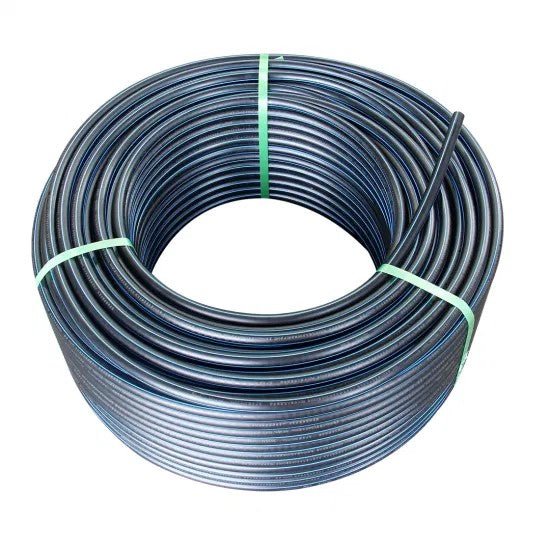Things to Know About Texas hdpe pipe manufacturer and Their Process
Wiki Article
Understanding the Secret Benefits of HDPE Pipeline for Water and Wastewater Administration
Using HDPE pipe in water and wastewater administration provides various benefits that warrant consideration. Its extraordinary durability and long life expectancy make it a favored selection for numerous projects. Additionally, the material's resistance to rust and chemical damage boosts its reliability in numerous environments. The advantages prolong beyond simply longevity and resistance. American Plastics HDPE Pipe Manufacturing. Exploring its cost-effectiveness and ecological effect discloses a lot more compelling factors for its widespread fostering in modern facilitiesExtraordinary Toughness and Durability

HDPE pipeline stands apart for its exceptional durability and durability, making it a recommended option in water monitoring systems. Built from high-density polyethylene, these pipes can endure substantial stress and tension, making sure reliable performance in time. Their durable nature enables them to withstand extreme environmental problems, including temperature variations and soil activities, which can cause other materials to fail.
The life-span of HDPE pipes usually goes beyond half a century, supplying a cost-efficient option for municipalities and markets alike. Furthermore, the product's light-weight properties streamline setup, minimizing labor costs and timeframes. This toughness lessens the requirement for constant fixings or replacements, further boosting its financial charm.
In water administration applications, the dependability of HDPE pipes means less disturbances and enhanced solution continuity, making them essential to sustainable infrastructure development. The mix of longevity and longevity strengthens HDPE's role as a foundation in efficient water monitoring solutions.

Resistance to Corrosion and Chemical Damage
While numerous products yield to deterioration and chemical damages gradually, HDPE pipes exhibit amazing resistance, making them suitable for various water monitoring applications. This strength comes from the molecular framework of high-density polyethylene, which is inherently non-reactive and does not rust like metals or weaken from direct exposure to rough chemicals. As a result, HDPE is extremely effective in settings with hostile materials, such as wastewater systems that might contain acids, bases, and organic solvents.
Additionally, HDPE pipelines can withstand environmental elements such as dirt acidity and saline problems, better enhancing their suitability for diverse applications (Midland TX HDPE Pipe Fittings in Stock). Their capacity to preserve architectural integrity over time lowers the danger of leaks and failures, which is important in ensuring the safety and dependability of water distribution and wastewater management systems. Subsequently, the resistance to corrosion and chemical damages substantially adds to the total performance and long life of HDPE piping services
Cost-Effectiveness and Economic Advantages
When thinking about the financial implications of water monitoring systems, the cost-effectiveness of HDPE pipes becomes noticeable. These pipes provide lower setup and maintenance costs contrasted to standard materials like steel or concrete. Their light-weight nature streamlines transportation and installation, resulting in lowered labor costs. Furthermore, HDPE pipes display a lengthy lifespan, usually exceeding half a century, which converts to fewer substitutes and long-term financial savings.Additionally, the resistance of HDPE to corrosion and chemical damages lessens the demand for pricey repair work and substitutes. The pipes likewise sustain reliable water circulation, lowering energy expenses linked with pumping systems. By minimizing leakages and water loss, HDPE pipes add to significant economic advantages for communities and markets alike. Generally, the first investment in HDPE piping can produce considerable economic returns over the lifespan of the water management system, making it a prudent option for sustainable facilities growth.
Ecological Sustainability and Lowered Impact

Versatility and Flexibility in Installation
Due to their unique residential or commercial properties, HDPE pipes supply impressive versatility and flexibility in installation, making them ideal for a vast array of applications. Their lightweight nature permits for less complicated handling and transportation, decreasing labor expenses and setup time. HDPE pipelines can be curved and shaped to fit numerous surfaces and task learn this here now requirements, which is specifically useful in testing environments.Additionally, their resistance to corrosion and chemical damage enables installation in varied settings without the requirement for specialized safety coatings. The capability to fuse joints develops a continuous, leak-free system, enhancing the total stability and dependability of the installment. HDPE's adaptability also fits ground movement, decreasing the risk of damage in locations susceptible to moving soil. On the whole, these characteristics make HDPE pipelines not only versatile yet additionally a preferred selection for water and wastewater management systems.
Frequently Asked Questions
How Does HDPE Pipe Contrast to PVC in Water Monitoring Applications?
HDPE pipeline offers exceptional flexibility, resistance to corrosion, and resilience compared to PVC. Its lighter weight helps with less complicated setup, while its lengthy life expectancy reduces replacement prices, making HDPE a preferred selection in water management applications.What Is the Life Expectancy of HDPE Water Lines Under Normal Problems?
Under common conditions, HDPE pipes can have a life-span ranging from 50 to 100 years. Their longevity and resistance to corrosion add to their long-term performance in different applications, making them a trusted selection for framework.Are HDPE Piping Recyclable After Their Service Life?
Yes, HDPE pipes are recyclable after their life span. hdpe pipe fittings Midland TX. They can be refined and repurposed into brand-new items, considerably decreasing ecological effect and advertising sustainability within the sector, making them an environment-friendly option for piping optionsWhat Is the Installation Process for HDPE Water Lines?
The setup process for HDPE pipes involves website preparation, trenching, pipe fusion or mechanical signing up with, backfilling, and stress screening. Correct techniques assure a durable and reliable system for carrying water and wastewater efficiently.Can HDPE Piping Be Used for Both Potable and Non-Potable Water Systems?
Yes, HDPE pipelines can be used for both potable and non-potable water systems. Their flexibility, durability, and resistance to corrosion make them appropriate for numerous applications, making certain risk-free and read the full info here effective transport of water in various contexts.Report this wiki page